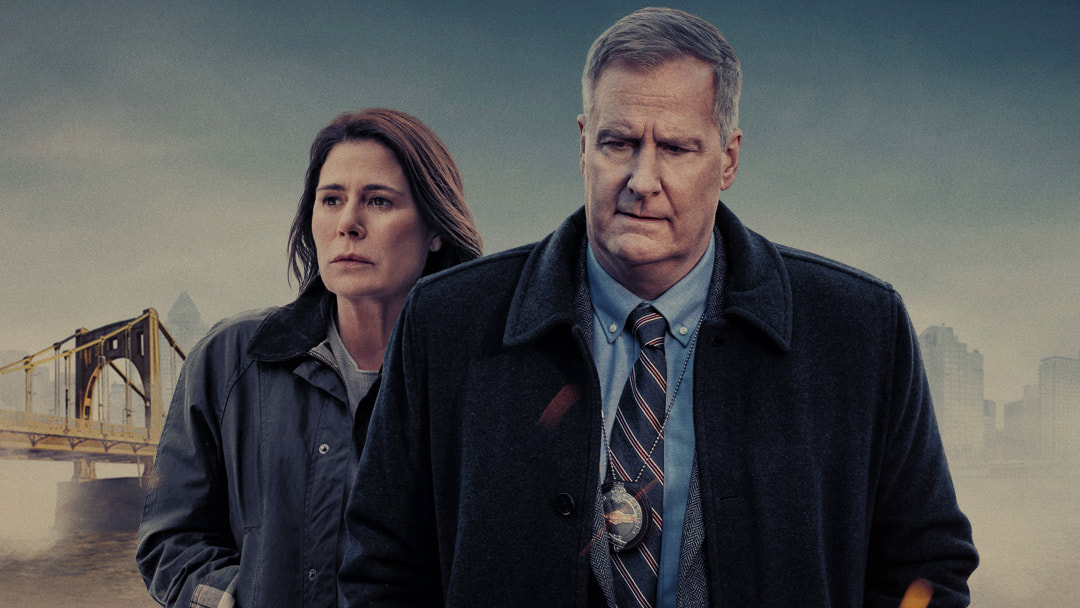 Key Art for ‘American Rust: Broken Justice’ Courtesy of Prime Video. Key Art for ‘American Rust: Broken Justice’ Courtesy of Prime Video. Dan Futterman and Adam Rapp are a pair of accomplished writers and producers, who currently serve as executive producers and writers for American Rust: Broken Justice on Prime Video. And we here at NTG had the pleasure of sitting down with both of them to discuss season two of this dynamic series. John Betancourt: What does it mean to each of you to be back for a second season? Dan Futterman: Oh, it's such a thrill. You know, we both love the novel, Philipp Meyer’s novel, American Rust. And we departed somewhat from it in the first season, but the characters were created by him, and the world was, and with a second season, we got to jump off from there, and just take a take a huge dive into the unknown. And that was really exciting. And we made a conscious decision. And it's a new chapter, it has a different title, Broken Justice. And we made a conscious decision, let's rev this up. Let's get this narrative rolling, we know the characters now. Let's throw them into very, very different situations, jeopardy, new relationships, jealousies, what would it be like, for instance, for Grace to have money for the first time in her life? That was, you know, things like that, and putting Del Harris in different, dangerous situation. All of it was exciting to do. And then to watch, because there's such good actors. Adam Rapp: I also want to say, like Isaac’s story, and him exploring his love life, and what that means to him to be a character who's out and to come and bring that to actual home to Pittsburgh. What does that mean, personally, physically, emotionally, and then to have him get involved with who he gets involved with, was really fun to figure out how to, like, you know, play with the audience's expectations, how to manage the storylines, there, and like, what his relationship to Billy and their friendship, what that would do to them, and would their friendship is be challenged by that, would it be enriched in some way. And then I also have to say, like, you know, bringing a lot of the story to Pittsburgh, to the city, and not relying on doing it so much on the outskirts of the town, was a pleasure. It was, in some ways easier, because we were closer to our base camp where we kept all our trucks and it was easier just to shoot, we had more hours of the day to shoot. But it was also just cool, because you can point the camera anywhere in Pittsburgh and get something interesting, bridges and bluffs and valleys and rivers and, you know, just the feeling of that town. And that texture is really cool to shoot. John Betancourt: Something I’ve enjoyed about season two, is just the moral conundrums that float around in this universe and all the questions that it asks, What are you hoping audiences take away from some of that underlying commentary? In season two, almost all of them? Adam Rapp: You know, I think the Del, Grace relationship comes front to me when you ask that question, I think about all the things that he did for her in season one, what he sacrificed like how he allowed his soul to like, maybe get tarnished a bit, the line he crossed, and then the thing he's trying to correct within himself by what he does in season two, and what she's trying to correct, and what she's trying to pay back to him, which ultimately gets paid back in some ways at the end. You know, those are really, really fun things to think about morally like, can we, correct, our wrongdoings? You know, it's that old Raskolnikov question, about do good deeds offset bad deeds, you know? And that's something that we talked about a lot in the writer’s room, like, what is the moral compass there? Dan Futterman: I have no idea who Raskolnikov is. (Laughter from all) Adam Rapp: “Crime and Punishment!” Dan Futterman: Yeah, I mean, you know, Jeff (Daniels), Del Harris is trying to pay penance for what he did in the first season, Grace does not see that as something that requires paying penance. So immediately you have this conflict between the two of them. Billy is trying to recover from what happened to him in the first season, Isaac is trying to live an open life in a town that that may or may not be quite ready for living that life. Everybody comes into this season with different challenges and different conflicts. And, and then to see them go through this and you know, in some way, it's weird when you're writing a second season, because you're both writing it and creating that and then also kind of watching them go through this because they have to react in a way that we all understand, is how they have to react. And letting yourself play into that and letting the characters play that out… is such a thrill. This interview has been lightly edited and condensed for clarity.
0 Comments
Leave a Reply. |
Archives
January 2025
|
|
© 2012-2025, Nerds That Geek LLC.
All Rights Reserved. |
uWeb Hosting by FatCow

 RSS Feed
RSS Feed